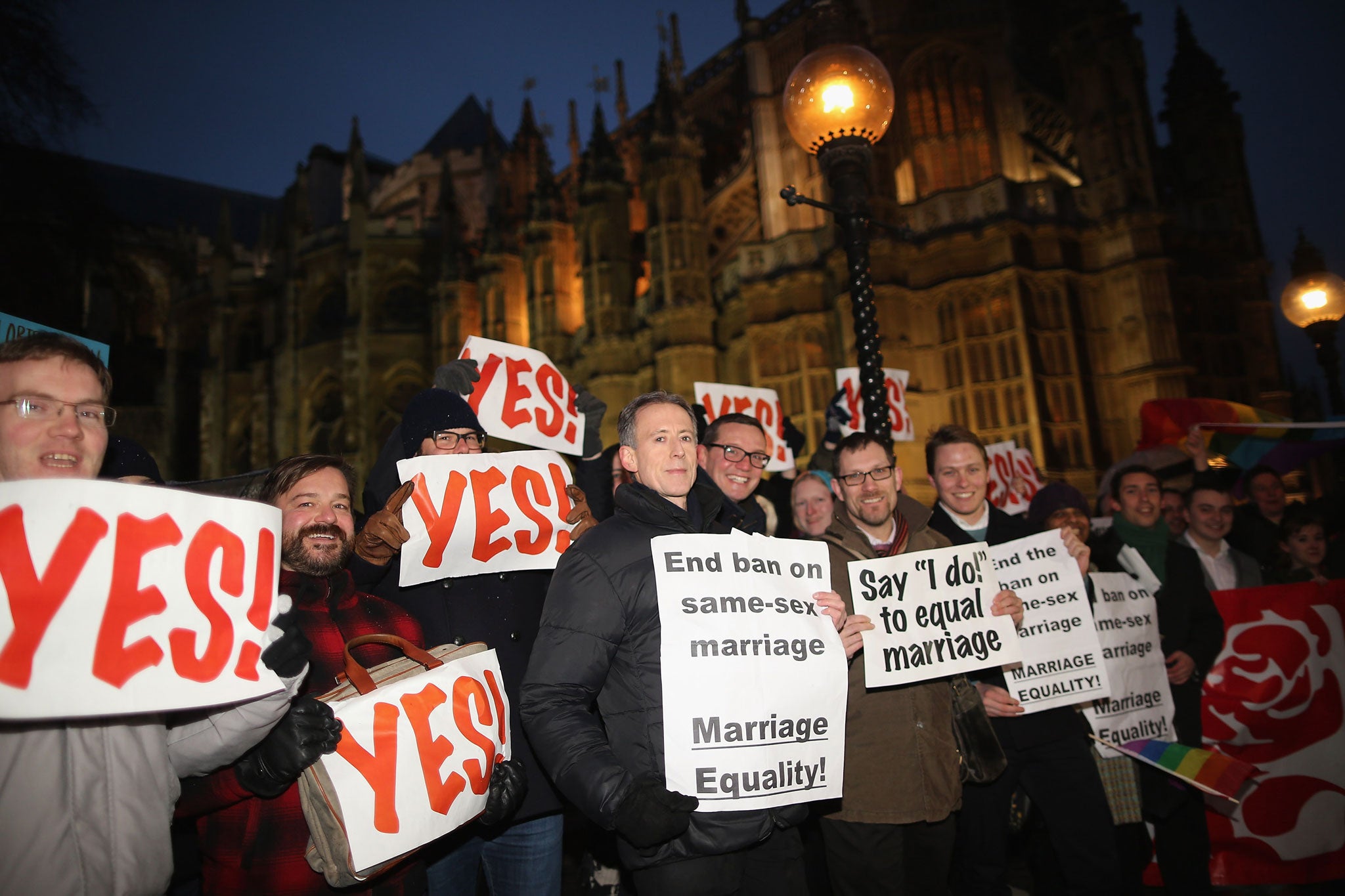Equal marriage: We've come a long way, and in 20 years' time we won't recall what the fuss was about
There is still stigma and shame, but this step says you're allowed to fall in love with whomever you like - no matter their gender or your own

Your support helps us to tell the story
From reproductive rights to climate change to Big Tech, The Independent is on the ground when the story is developing. Whether it's investigating the financials of Elon Musk's pro-Trump PAC or producing our latest documentary, 'The A Word', which shines a light on the American women fighting for reproductive rights, we know how important it is to parse out the facts from the messaging.
At such a critical moment in US history, we need reporters on the ground. Your donation allows us to keep sending journalists to speak to both sides of the story.
The Independent is trusted by Americans across the entire political spectrum. And unlike many other quality news outlets, we choose not to lock Americans out of our reporting and analysis with paywalls. We believe quality journalism should be available to everyone, paid for by those who can afford it.
Your support makes all the difference.The incoming Archbishop of Canterbury repeated a much-cherished but completely wrong statement this week. He said that marriage has always been between a man and a woman, and it would be wrong to change it. In fact, marriage has changed considerably over the centuries.
More than one Roman emperor married a man, until same-sex marriage was outlawed in AD 342. Many cultures still conceive of marriage between a man and several women – my own husband’s great-grandfather married polygamously, so it isn’t all that remote.
In France, it is perfectly legal for a marriage to take place between a living person and a dead one, and in China, between two dead people. In this country, it has only been legal to marry your deceased wife’s sister since 1907. And so it goes on.
The Archbishop of Canterbury sounded like an English chef announcing that nobody, in the history of the world, has ever eaten horse.
The concept of marriage, far from being an eternal verity, has changed considerably over the years and between cultures. It might, too, have been possible to believe that the concept and the word was owned by a single body at one point in history – perhaps a couple of hundred years ago. But not any longer. Marriages come in all shapes and sizes. Yours is not like your neighbours, and is certainly not like the marriage that you might have had 50 years ago.
The description of a formal, legal union between people of the same sex as “marriage” is an important step. People understand a marriage in ways which they do not, quite, understand a civil partnership. I routinely describe the man I am civilly-partnered to as “my husband”. Not everyone understands, and I am quite often challenged. The equality representative in the Exeter University faculty I used to work for asked me, in public, whether that made me “the wife” in the relationship. I don’t suppose that being able to describe oneself as in a marriage rather than in a civil partnership would stop that.
But it would be a start in challenging ignorance, if not active malice. We’ve come a very long way towards equality in this area. There are plenty of people still living in relationships that began when such relationships were illegal. In the early 1980s, when I first identified myself as gay, one was equal in almost no area – age of consent, public displays of affection, employment laws, and areas of public life. There were almost no publicly identified homosexuals. To be homosexual at all was still illegal in parts of the United Kingdom.
Now, we’ve come a long way towards equality. There is still stigma and shame in areas of public life – in all the talk of diversity at last summer’s Olympics, few people noticed that virtually no sports people were prepared to come out as gay. Worldwide, only very recently has the United Nations begun to consider the abuse of gay people as a human rights issue, thanks to the personal investment of Ban Ki-moon.
But the introduction of marriage as a concept, and as a word, is an important step. It says that you’re allowed to fall in love with whomever you like, and if they love you back, you’re allowed to take whatever steps anyone else may take to cement it. People who oppose the extension of the concept of marriage are not defending the status of their own marriage: they are dictating what love is allowed to look like in the lives of people they will never meet.
In 20 years’ time we won’t remember what any of this fuss was all about. It will all look very much like the furious arguments over the Deceased Wife’s Sister Act of 1907.
Join our commenting forum
Join thought-provoking conversations, follow other Independent readers and see their replies
Comments